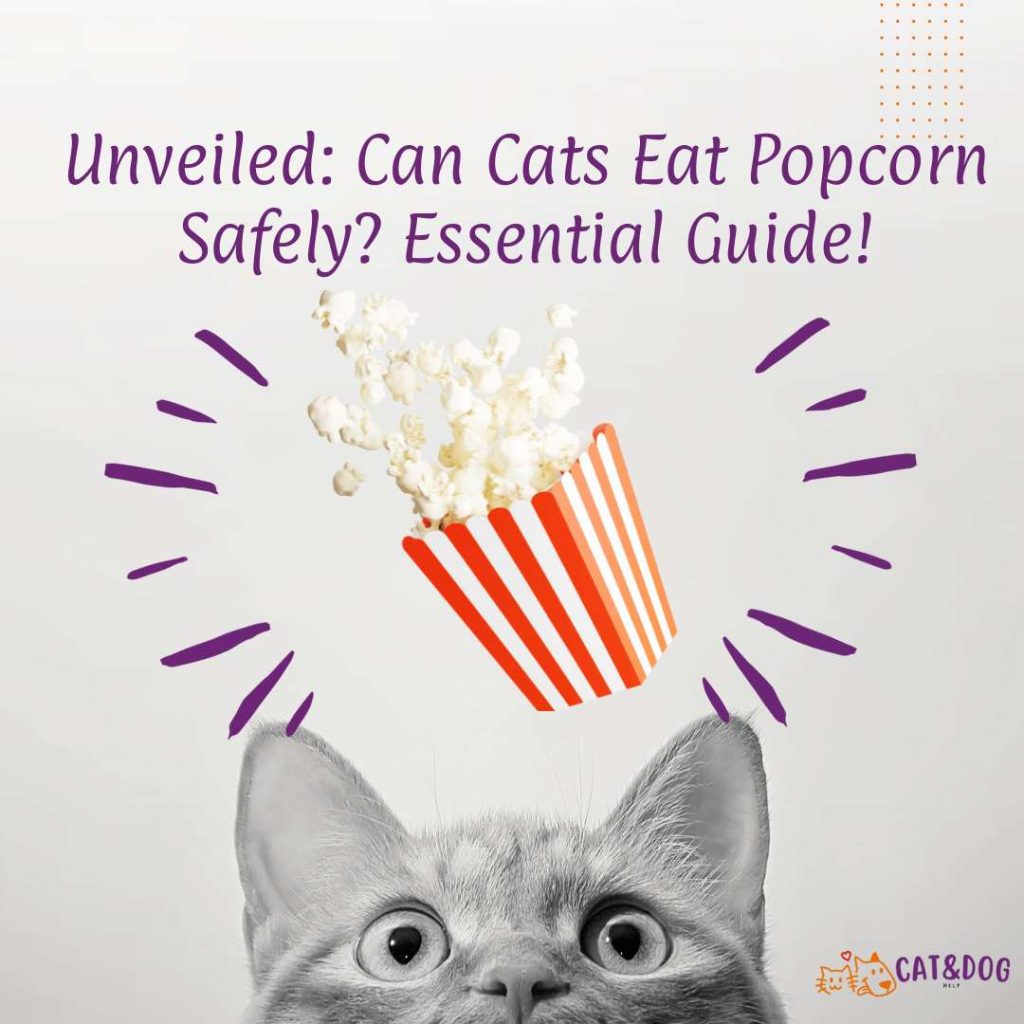Popcorn has long been a favorite snack for movie nights and cozy evenings, but have you ever wondered if it’s safe to share with your feline friend?
While it’s true that plain popcorn is not considered toxic for cats, it’s still not an ideal treat for them.
The primary concern, aside from potential choking hazards, is the added salt and butter that we humans often enjoy on our popcorn. Unfortunately, these flavors can lead to health complications for your kitty.
Cats’ digestive systems have evolved to thrive on a diet centered around protein, not carbohydrates found in grains like corn.
Offering popcorn as a snack might not be the best option for your cat’s health, especially when considering the high levels of fat and sodium found in buttered and salted varieties.
So, while the occasional unsalted, unbuttered kernel may not cause harm, it’s essential to avoid giving cats popcorn regularly for the sake of their long-term health.
Key Takeaways
- Unsweetened, unbuttered popcorn is not toxic for cats, but providing it regularly is not recommended
- Buttered and salted popcorn can lead to health issues for felines, such as obesity and high blood pressure
- To keep your cat healthy, focus on providing high-quality protein sources and try healthier treat options
Can Cats Eat Popcorn?
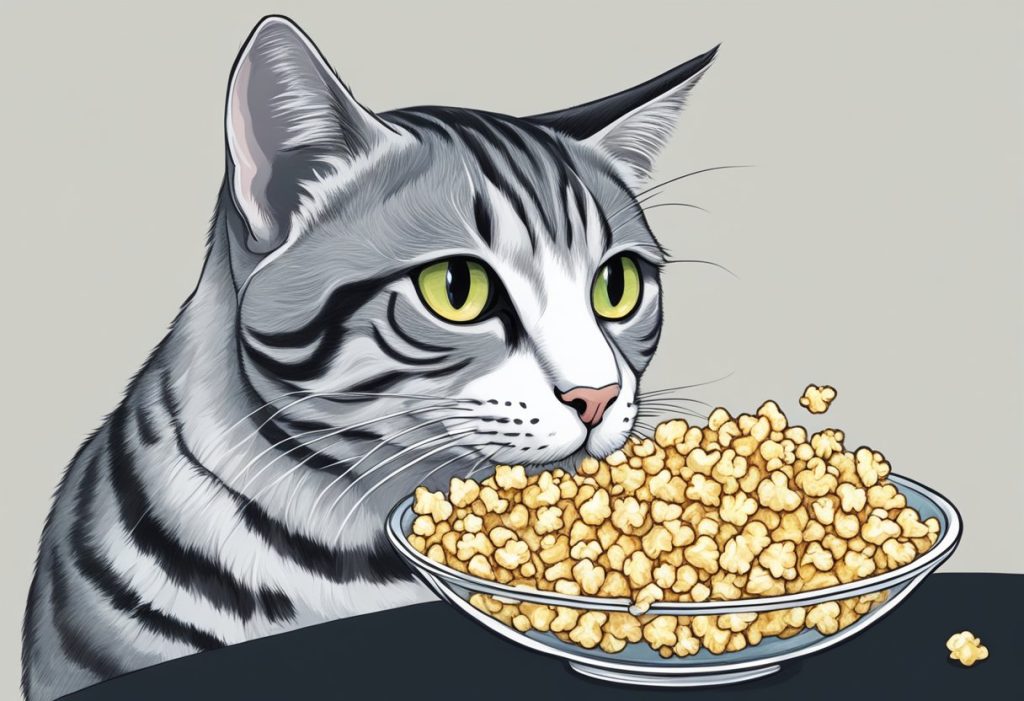
You might be wondering if it’s safe to share your popcorn with your beloved feline friend. While it’s true that popcorn is not on the ASPCA’s list of toxic foods for cats, that doesn’t mean it’s the best snack choice for them. (1)
Cats, being obligate carnivores, primarily require animal-based protein in their diet, and popcorn offers little nutritional value for them. While not toxic, there are some health risks associated with cats eating popcorn.
Air-popped popcorn, without any added butter, salt, or seasonings, is technically non-toxic for your cat.
However, most popcorn consumed by humans typically contains salt, butter, or other flavorings, which can be problematic for your cat’s digestive tract.
These added ingredients can cause health issues for your kitty, including obesity, diarrhea, or even pancreatitis due to high-fat content. If your cat is already showing diarrhea symptoms, check here an article on what to feed a cat with diarrhea.
Aside from nutritional concerns, popcorn can pose some physical risks for cats. Unpopped kernels can be a choking hazard or even cause intestinal blockage in curious felines.
It’s important to keep a close eye on your cat while they’re playing with popcorn, as they may be tempted to eat the kernels.
In conclusion, while popcorn is not explicitly toxic to cats, it’s not the healthiest treat option. Due to potential health risks, it’s best to avoid giving popcorn to your cat, opting instead for a more suitable snack or treat designed specifically for cats.
The Truth About Buttered Varieties
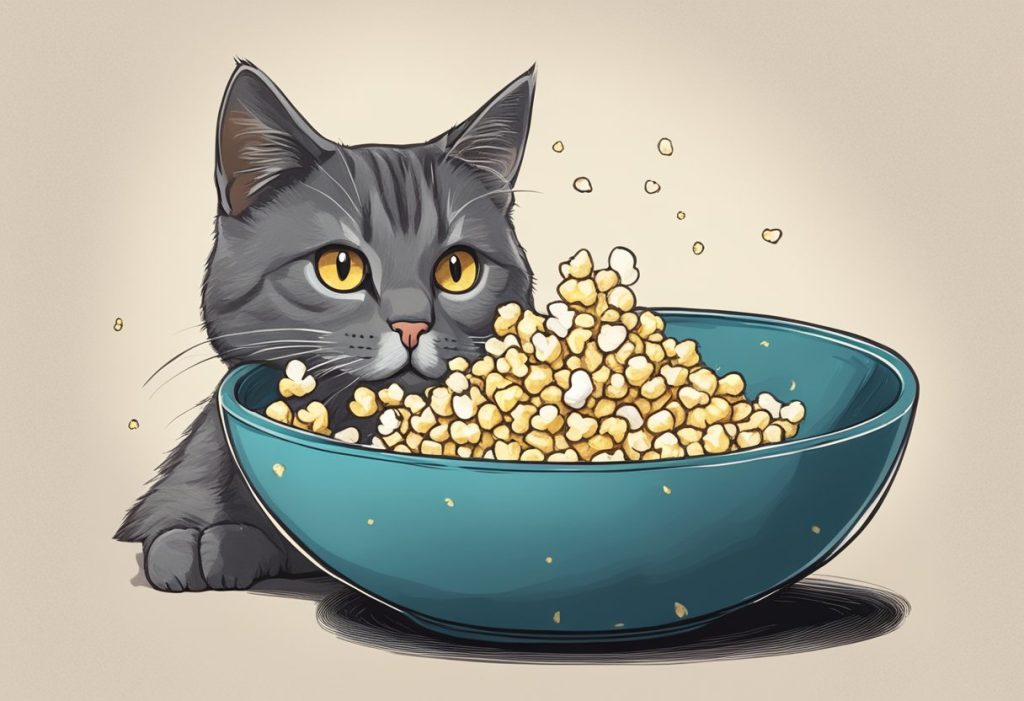
When it comes to buttered popcorn, you might wonder whether it’s alright for your cat to share this tasty snack with you.
Unfortunately, buttered popcorn isn’t a good option for your feline friend. Butter, which is high in fat, combined with salt, can lead to various health issues for cats.
Cats are obligate carnivores and need a meat-based protein diet to maintain their health.
Consuming buttered popcorn may lead to health problems such as obesity, pancreatitis, and dehydration. Moreover, the artificial flavors usually present in buttered popcorn can harm your cat. (2)
It’s essential to consider the potential choking hazards of popcorn, as well. Kernels, in particular, can become lodged in your cat’s throat or cause intestinal blockage. Being cautious with your cat’s consumption of popcorn, especially the buttered varieties, is crucial for their well-being.
In conclusion, it’s best to avoid feeding your cat buttered popcorn due to the high content of fat, salt, and artificial flavors. Instead, stick to cat-friendly treats and always consult with your veterinarian for guidance on your cat’s dietary needs.
Salted Popcorn for Cats
As a cat owner, you might be wondering if it’s safe to give your cat salted popcorn as a treat. While popcorn itself is not toxic to cats, the salt can pose various health risks.
Commercial Popcorn Safety
When considering commercial popcorn products, it’s essential to note that they often come with added salt and other seasonings that can be harmful to your cat.
Consuming too much salt can lead to imbalances in your cat’s bodily functions and negatively affect their kidneys. (3)
Cats should only ingest small amounts of salt in their diet, and excessive sodium intake can even lead to sodium poisoning. Symptoms of salt toxicity in cats may include vomiting, diarrhea, tremors, and seizures. In severe cases, it can even lead to a comatose state.
Moreover, popcorn sizes found in commercial products can pose a choking hazard to cats. The kernels may get lodged in their throat or respiratory system, causing discomfort or even severe injury.
In conclusion, although popcorn in its plain form is not harmful to cats, the added salt in commercial products poses potential health risks. It is generally not recommended for your cat, and it is safer to consult your vet if you are looking for an alternative snack for your beloved feline friend.
Nutritional Advantages and Dangers of Consuming Popcorn
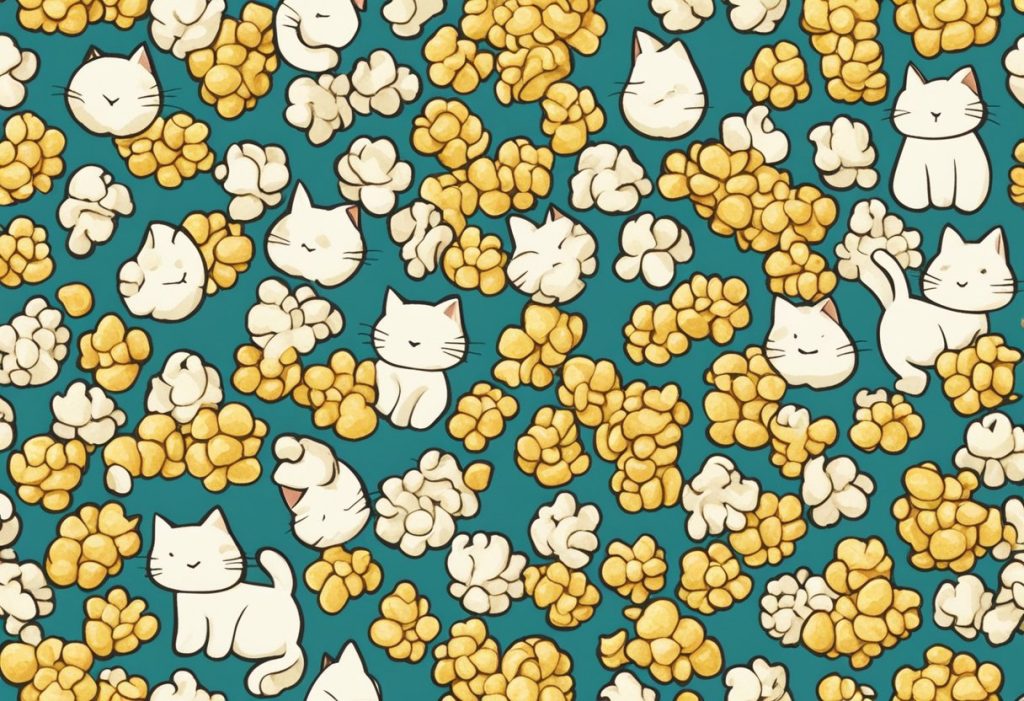
Popcorn is made from corn, a whole grain containing some nutrients such as fiber, vitamins, and minerals.
However, for cats, it provides little to no nutritional benefits. Cats are obligate carnivores, which means they require a diet rich in animal protein to thrive.
Despite having some fiber, the carbohydrate content in popcorn is high, and it is not an ideal snack for cats.
Too many carbohydrates can contribute to obesity in cats, and since their primary nutritional needs are not met with popcorn, it is not recommended to be a part of their regular diet.
When it comes to dangers, salted or flavored popcorn presents risks for felines. Salt can lead to sodium poisoning and have negative effects on their blood pressure and heart health.
Additionally, popcorn coated in butter, cheese, or other artificial flavors poses potential risks due to added fats and harmful ingredients.
Moreover, popcorn kernels can cause choking hazards or intestinal blockages for cats. Hard, un-popped kernels may damage their teeth or gums, while smaller pieces can get lodged in their digestive tract, causing discomfort and potential harm.
Other Articles Read You Would Want To Consider
Popcorn Consumption: Situations to Avoid
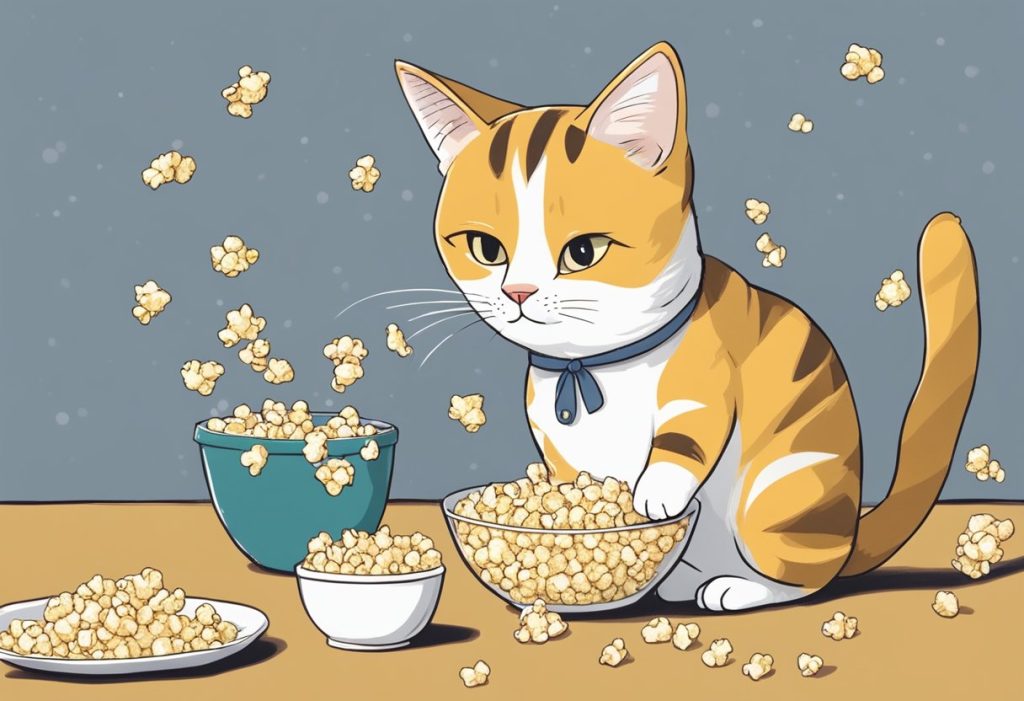
When it comes to cats and popcorn, there are certain situations that you should avoid to ensure their safety and well-being.
First and foremost, be cautious with popcorn kernels. They can pose a choking hazard for your feline friend due to their size and hardness.
Moreover, if swallowed, these kernels can lead to intestinal blockage, causing serious health issues. As an obligate carnivore, your cat’s body isn’t designed to process such items effectively, making them more susceptible to such problems.
Another concern is the presence of toxic ingredients in some popcorn varieties. For example, buttered, salted, or flavored popcorn may contain high amounts of fat, salt, artificial flavors, and other additives that can be harmful to cats.
These substances may lead to health issues such as obesity, kidney problems, dehydration, and sodium poisoning. It’s crucial to avoid sharing these types of popcorn with your cat.
In addition, commercial popcorn products may contain preservatives and other additives that aren’t suitable for your cat’s unique dietary needs.
Always read the labels carefully before feeding your cat any popcorn, and consult your vet if you have any concerns.
Cats, being obligate carnivores, have specific nutritional requirements. While they may enjoy the taste and texture of popcorn, the fact is that it doesn’t offer any substantial nutritional benefit for them.
Feeding your cat popcorn frequently may lead to deficiencies in essential nutrients, causing various health issues.
In conclusion, while popcorn on its own may not be directly toxic to cats, it’s crucial to be aware of the potential hazards and situations to avoid when it comes to popcorn consumption. As a responsible cat owner, it’s essential to prioritize your cat’s safety and well-being by making informed decisions about the treats you share with them and being attentive to their unique dietary needs.
Other Articles Read You Would Want To Consider
The Stance on Cat Food with Corn Ingredients

As a cat owner, you might wonder whether corn ingredients are suitable for your feline friend’s diet. Cats are obligate carnivores, meaning they require a diet high in animal protein to thrive. So, what about corn ingredients in their cat food?
Research suggests that corn, when used as a filler or binder in low-quality cat food, doesn’t provide any essential nutrients for cats.
In fact, it may compromise their health. Corn ingredients can potentially cause allergies, inflammation, obesity, diabetes, and urinary tract infections in cats. As a result, vets and nutrition experts generally recommend avoiding cat foods that contain corn.
Premium cat food brands usually exclude corn from their recipes and instead focus on high-quality animal proteins and grain-free ingredients.
When searching for the perfect cat dry food for your furry friend, make sure to always check the ingredient list and prioritize items that have real animal proteins listed as the first few ingredients.
To ensure your cat’s diet is well-rounded, you may opt for cat food with limited ingredients that don’t contain corn. This way, you’re taking a step toward improving their health and overall well-being.
Remember, it’s essential to consult with your vet when deciding on the best cat food for your feline companion. They can offer tailored advice based on your cat’s specific needs and help you navigate the complex world of cat food ingredients.
Exploring Healthier Cat Diet Options: Untamed
As a cat owner, you may want to consider other, more suitable options for your feline’s diet. Cats primarily need protein for their nutritional needs, requiring sources such as meat and fish to thrive and maintain their health.
Popcorn, even though it’s not toxic for cats, does not contain vital nutrients such as protein that are essential for your cat’s well-being.
Instead, it is better to explore cat food options specifically tailored to fulfill their dietary requirements, including ample amounts of protein and other nutrients.
One such brand to consider is Untamed, which focuses on offering natural, high-protein diets to cats.
Inspired by the ancestral diet of wild cats, Untamed provides a balanced and complete meal plan consisting of high-quality meats, fish, and other essential ingredients for felines.
Their recipes incorporate only natural foods and aim to prevent common health issues in cats.
Apart from protein, Untamed also ensures that its cat food products contain other vital nutrients like fruits, vegetables, herbs, probiotics, and omega fatty acids. They prioritize a holistic approach to nutrition, aiming to promote sustained feline health.
To make things more convenient for cat owners such as yourself, Untamed offers home deliveries, so you can be sure that your cat is getting the best possible nutrition right at your doorstep. With a healthier diet in place, your cat can avoid health issues that may arise from consuming popcorn and other unsuitable human foods.
In summary, remember that prioritizing a high-quality, nutritious cat food brand like Untamed will have a greater impact on your cat’s health and well-being. It’s essential to ensure your furry friend is getting the ideal diet, focusing on protein-rich sources and other vital nutrients specifically tailored for their needs.
Making Feline-Friendly Popcorn at Home
If you’re a popcorn fan and want to share the experience with your feline companion, making feline-friendly popcorn at home might be the solution.
To do this, you need to ensure that it’s plain and air-popped, without added salt, butter, or other toppings that could be harmful to your cat.
Begin by using a hot air popper or a stovetop method with minimal oil.
It’s essential to avoid adding any seasonings or flavors that might be unhealthy for your cat, such as butter, salt, and artificial additives. Instead, stick to plain popcorn popped in its natural form.
Your cat may be more likely to eat freshly popped popcorn while it’s still warm, but be careful not to serve it too hot.
It’s worth noting that while popcorn in moderation might not be harmful for your cat, it doesn’t provide any significant nutritional benefits either.
Cats are obligate carnivores, which means their primary source of nutrition should come from animal proteins, not popcorn or other plant-based foods.
In conclusion, although popcorn might be a fun and occasional treat for your cat, it’s essential to prepare it in a feline-friendly way by ensuring it’s plain and using minimal oil. Remember to keep the popcorn in moderation and always prioritize your cat’s regular diet to ensure they receive proper nutrition.
Exploring Flavors: Different Seasonings for Popcorn

When it comes to popcorn toppings, there’s a wide variety of flavors available for human consumption. However, not all toppings are safe for our feline companions.
In this section, we’ll discuss several popular popcorn seasonings and whether or not they are non-toxic for cats.
Plain, air-popped popcorn without any added flavors or seasonings is technically non-toxic for cats.
Nevertheless, it does not offer any significant nutritional value for them, as cats require a balanced and appropriate cat food diet to meet their specific dietary needs.
Butter and Salt: Cats have a low tolerance for salt and excessive amounts can lead to sodium poisoning, high blood pressure, and heart disease. Butter, on the other hand, contains high amounts of fat that can contribute to obesity and pancreatitis in cats. Therefore, it is best to avoid feeding your cat popcorn seasoned with butter and salt.
Garlic and Onion Powder: These seasonings should also be avoided when it comes to cats. Both garlic and onions contain compounds that can cause gastrointestinal distress and even lead to anemia in cats.
Sweet Flavors (Caramel, Chocolate, etc.): Sweet popcorn flavors can be tempting for pet owners to share with their feline friends, but these should be avoided as well. Cats should not consume chocolate as it contains theobromine, a substance toxic to cats. Caramel flavored popcorn can also pose a threat, as it is made with sugar and potentially dairy products that can be difficult for cats to digest.
Cheese Powder: Although cheese is not directly toxic to cats, feeding them popcorn covered in cheese powder may not be recommended. Many cats are lactose intolerant, and the high levels of sodium found in cheese powder can also pose risks to their health. Read more about our recent article on Can cats eat cheese?
In conclusion, when considering flavored popcorn for your cat, it’s best to provide them with plain, air-popped popcorn without any additives. This ensures that you’re not giving them anything harmful or toxic, while still treating them to an occasional snack that is safe for them to consume.
Nutritious Feline Treat Options
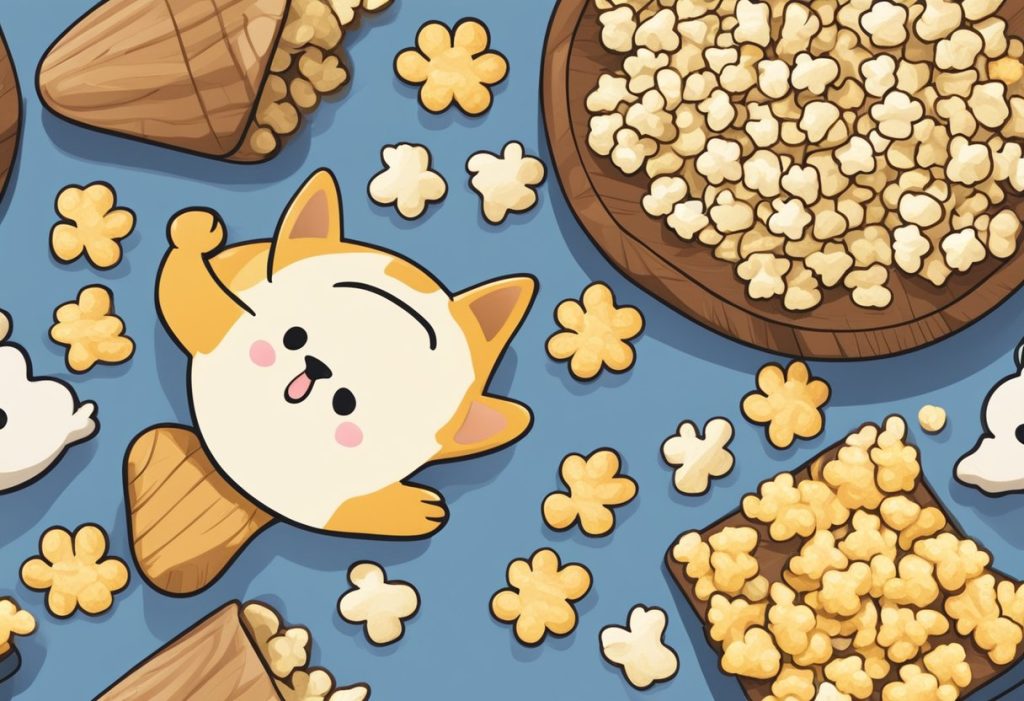
As a cat owner, it’s important to provide your furry friend with treats that not only taste good but also offer proper nutrition. While popcorn might not be the best snack for your cat, there are healthy alternatives you can consider.
When choosing treats for your cat, prioritize those rich in protein, as cats are obligate carnivores and require animal-based protein sources.
Some nutritious and protein-rich treat options include freeze-dried chicken or salmon, catnip, and quality commercial cat treats made with real meat. Remember to always check the ingredient list, and go for treats that avoid artificial additives and fillers.
Cats can also benefit from safe and natural snacks. Offering small amounts of cooked meat (devoid of fat, seasoning, and bones) or eggs (cooked without any additives like salt or oil) can be a delicious and healthy option for your feline companion.
In addition, you can occasionally introduce certain fruits and vegetables into your cat’s treat rotation, as they provide vitamins, minerals, and antioxidants. Safe options include de-seeded and chopped apples, cooked sweet potatoes, or steamed green beans.
However, make sure to consult your vet before introducing any new items into your cat’s diet, as some may be toxic or cause digestive distress.
When offering treats to your cat, remember that moderation is key to avoid excess weight gain or disrupting their nutritional balance. Limiting treats to 10% of your cat’s daily caloric intake is a good rule of thumb to ensure they maintain a healthy diet.
Frequently Asked Questions

Is sugar-coated popcorn safe for cats?
While popcorn itself is not toxic to cats, any added sugar, butter, or salt can be harmful. Sugar-coated popcorn isn’t a safe choice for your feline friend, as it contains excessive amounts of sugar that can lead to obesity, dental issues, and other health problems in cats.
Can felines eat microwave popcorn?
Microwave popcorn typically contains added oils, butter, or artificial flavors that may not be suitable for your cat. Although a small piece of plain popcorn may not be dangerous, the additives in microwave popcorn can be harmful to your cat’s health. It’s better to avoid feeding microwave popcorn to your feline friend.
Is kettle popcorn a viable option for cats?
Kettle popcorn, like other flavored popcorn varieties, is also not advisable for cats. Although the popcorn itself is not toxic, the additional butter, oil, and salt used in kettle popcorn can be harmful to your cat’s health.
Will buttered popcorn harm cats?
Buttered popcorn is not recommended for cats because of the high amounts of fat, salt, and artificial flavors typically present. These ingredients can be detrimental to your cat’s health, leading to issues such as obesity, pancreatitis, and other digestive problems.
Can felines consume salt?
Cats can consume a minimal amount of salt; however, excessive salt intake can lead to sodium poisoning, high blood pressure, and heart disease. It’s essential to keep your cat’s salt intake limited to a safe level.
Is Smartfood popcorn suitable for cats?
Smartfood popcorn, like other flavored popcorn varieties, is not suitable for cats. It also contains additional flavorings that may be harmful to your cat’s health. Stick to cat-appropriate food and treats to ensure your cat stays happy and healthy.

